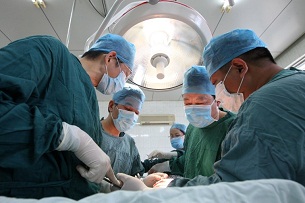The New York Times’ Didi Kirsten Tatlow reports that former deputy health minister Dr. Huang Jiefu has denied that a new voluntary organ transplant system allows the harvesting of executed prisoners’ organs. Last week, Tatlow had reported on disappointment from the international medical community after a comment from Huang suggested a loophole on in the new system allowed for the continuation of a long-criticized program that heavily relied on organs from executed prisoners:
The official, Dr. Huang Jiefu, said his statements that prisoners were also citizens and therefore should be allowed to donate organs under the new rules had been meant “philosophically,” and he denied that the government was allowing it in practice.
[…] In the interview last week, in the foundation’s offices, Dr. Huang did not deny making the comments attributed to him, and he repeated his contention that prisoners “have a right” to donate organs.
[…] “Dr. Huang’s statements, even if he says now that he meant them only theoretically, have influenced many, many transplant professionals in China who believe that it is ethically correct for prisoners to donate,” said Dr. Huige Li, a professor at the University of Mainz, Germany, and a board member of Doctors Against Forced Organ Harvesting. “If prisoner organ donation is also theoretically correct, what can prevent it happening?”
In the interview, Dr. Huang said he could not rule out that prisoners’ organs were still being used illegally, but said they were no longer used in the state-run system that administers organ donation and distribution.
“In governmental systems, no,” he said. “However I cannot say there are no organs from executed prisoners.”
“They are not allowed to be used,” he added. “Not that they have stopped being used.” [Source]
A vast majority of transplanted organs in China had long come from executed prisoners, a fact commonly criticized by international health and human rights organizations. Recently, China launched pilot programs aimed at eventually overhauling the system nationwide to rely on voluntary donations. Last December, the Ministry of Health vowed that the harvesting of prisoner’s organs would be completely phased out by January 1, 2015. Tatlow’s earlier report cited a World Medical Association official who claimed that the announcement was “an administrative trick,” allowing prisoner donations to simply qualify as citizen donations.
Chinese state media has recently reported on another problem with the new voluntary donation system: the vast majority of organs donated to the new national network have so far gone unused. AFP reports:
Authorities expected to have more than 2,500 organ donors this year, the Beijing Youth Daily said, citing Huang Jiefu, head of the China Organ Donation Committee and a former vice health minister.
That could “technically” make possible 2,500 heart transplants and 5,000 lung transplants, he told the paper, but only just over 100 heart transplants have been carried out since January, and a similar numbers of lung transplants.
“On the one side there is a shortage, on the other side there is waste,” he was quoted as saying.
The paper blamed slow transport and poor co-ordination for the losses. [Source]








